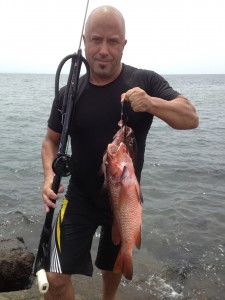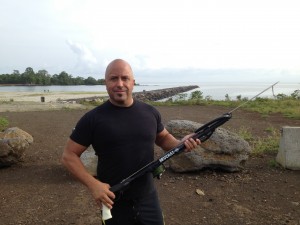A Day in the Life – Africa Part 2
In Part 1 I took you through a somewhat typical (albeit short) workday. Part 2 of this multi-part series brings you along as my colleagues and I immerse ourselves in Malabo’s culture (or lack thereof, depending on your perspective). As I did in the first part, this telling of the tale is an amalgamation of events spread across my time in West Central Africa.
Having finished our workday at the unusually early time of 7:30AM, four of us pile into our Toyota Hilux, (a virtually indestructible pickup truck according to the boys over at Top Gear) and head to Bioko Island’s northeast corner. Our destination is the beautiful and opulent Sofitel Resort. Their manmade beach, spear fishing-tastic perimeter jetties, and boat/personal watercraft rentals, coupled with a Caribbean style resort, make it the perfect getaway for Africa-weary world travelers.
Completing the thirty-minute trek, we arrive too early for beachside sunbathing, instead opting for the eastern perimeter jetty. It’s spear fishing time. While I’ve done it in the Caribbean, this is my first foray into West Central Africa’s shark-infested waters, with the intention to spill fish blood. (Hey, we’re helicopter pilots; we fear hard work more than death.)
Having donned our masks, snorkels, and fins, we slide into the warm water. Now we have entered the food chain … and not at the top. Harassing my wetsuit wearing compadres, I taunt, “Pussies.” (Ten jellyfish stings later, I decided next time I’ll join the estrogen-embracing ranks.)
Our prized catch is the large red snappers that live in the jetty’s numerous hidey-holes. Unlike many fish that will swim directly in front of you—begging to be shot—red snappers are as skittish as a long-tailed cat trapped in a square dancing convention. One must employ guile and cunning tactics to even see one, let alone fire on it.
Most of the quarter-mile long jetty sits in thirty feet of water. One effective tactic employed free-diving 30′ down to the sandy bottom at the jetty’s edge. You had to take a good gulp of air, because once there, you needed to lay motionless for the better part of a minute before a red snapper would decide the coast is clear, and venture into your sights.
William, a French engineer from our compound, had great success hovering in a three-foot thick layer of muddy water that occupied the ocean’s surface for the first thirty yards of the leeward side of the jetty. Opposite the beach, the water on that side dropped to thirty feet deep within a few feet of the shore. The fish in the perfectly clear water under William’s murky observation point never spotted his mask and speargun jutting from the muddy water overhead.
Niko, one of our South African helicopter mechanics, spots a couple of large fish near the tip of the jetty. Diving down, stalking his prey, he chases them into the rocks where they affect their escape. Looking up to begin his ascent, he finds a large barracuda overhead. Drawing a bead, he shoots it, catching the huge fish center-of-mass. In an instant, his $200 speargun explodes from his hand and disappears toward the horizon. Chasing the bubbles left in its wake, Niko searches in vain for the fish and gun. After foraying a couple of hundred meters into the open ocean, he begins to feel exposed, (here there be monsters) and dejected, returns to the relative safety of the jetty.
Working my way along the jetty, I spot an area teaming with marine activity. Applying my newly acquired tactics, I hyperventilate for a few seconds, take a Texas-sized gulp of air, and dive thirty feet to the rocky sand at the jetty’s edge. Lying motionless at the foot of a mountain of four to six foot thick boulders, I try not to think about how distant the surface looks. Thousands of small tropical fish slide in and out of the gaps in the rocks. The sound of my heartbeat mixes with the ever-present clicks and ticks of coral-based life. Just as my oxygen begins to wane, I see a big red snapper venturing from a nearby hidey-hole. For a second, it swims right at me. Slowly, I point the spear at him. At two meters, it sees me, or the movement, and darts sideways just as I pull the trigger. Catching the snapper dead center, I begin my ascent.
The surface never looked so far. My chest heaves involuntarily, my body’s self-defense mechanism working to draw in air. Mouth clamped shut against my insistent lungs I continue to rise. Breaching the surface, I shout in victory (between huge breaths).
 Searching the jetty’s edge, I spot a speargun-less Niko next to the dive buoy and fish line. He’s hundreds of yards farther up the jetty … go figure. After ten or fifteen minutes of swimming with a large bleeding fish in tow, and having acquired a following of four circling barracudas, I finally reach Niko. Handing him my speargun, I tell him to try to hold on this time.
Searching the jetty’s edge, I spot a speargun-less Niko next to the dive buoy and fish line. He’s hundreds of yards farther up the jetty … go figure. After ten or fifteen minutes of swimming with a large bleeding fish in tow, and having acquired a following of four circling barracudas, I finally reach Niko. Handing him my speargun, I tell him to try to hold on this time.
Speargun-less, I grab my iPhone in its Lifeproof waterproof cover and shoot a fifteen-minute underwater HD video. The results are spectacular. Here’s a short clip: iPhone Underwater Video Clip (If the video doesn’t play in your browser, right-click the link and save it to your computer. Then play it with your favorite video software.)
After three hours, and with a plentiful bounty, (and minus one speargun) we call it a day (the fishing part of it anyway). William, who needs to pick up his wife at the French embassy, takes the fish and gear while the rest of us head into the resort for a little exploration.
However, that’s a tale I’ll save for the next part of the series.

